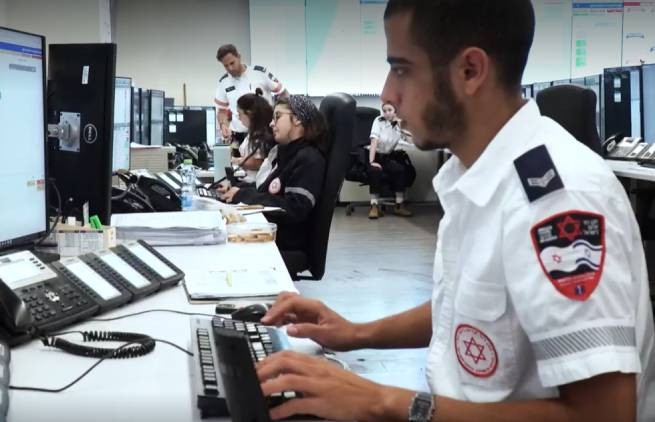Ambulance dispatcher Adar Gershoni will never forget the call of a 6-year-old child who hid in a closet and asked over the phone to help his parents lying in a pool of blood.
Details of what happened on October 7, after the Hamas invasion of Israel, are only now beginning to emerge. Ambulance Service dispatchers said journalists “News of Israel”, what happened that day, how they received dozens of calls with pleas for help. Some spoke on the phone in a whisper, others died right during the call. And dispatcher Gershoni from the MADA control room in Kiryat Ono still cannot hold back his tears, remembering the little boy’s call:
“He said that he was calling from the closet, and for some reason his mother, father and two brothers were lying on the floor and not moving. The boy begged for an ambulance to be sent as soon as possible. I advised him to continue sitting in the closet and deceived him that help would arrive soon. In fact, I already knew that the dozens of teams we sent out on calls could not get through to the wounded because of the roadblocks set up to contain the Hamas attack.”
On October 7, at 6:30 a.m., the night shift workers in the MADA control room finished their shift and were about to hand it over to the morning workers. National Control Room Inspector Omri Levy recalls:
“At about 6:35, security forces reported that terrorists had entered Israeli territory by paragliding. We immediately realized that this was not a rocket attack, but something else.”
Pniel Buskila, a control room employee who went on duty during the morning shift, says:
“Within a few minutes, a flood of calls began to the control room. Both the wounded themselves and those who reported them called. The first calls concerned gunshot wounds. I received continuous calls one after another from the area of Kibbutz Reim, from young people from the music festival. Some spoke whispers, others called from hiding, while shooting continuously sounded in the background.”
The MADA central control room switched to emergency mode and became a bunker for rescue forces. At this time, paramedics in the south were on their way to their regular morning shift. They heard alarms and the first reports of emergency events, and immediately rushed to help the victims.
During the evacuation of the wounded, the driver of one of the ambulances was shot. In Kibbutz Beeri, a paramedic wanted to provide assistance to the local medical center, but when he was taking out a wounded woman, terrorists burst in and shot both of them.
The MADA dispatch service began sending ambulances to the disaster site, sending them from other parts of the country. But only teams located in the very south could actually evacuate the wounded, since later the police and army closed the passage for 6 hours. This determined the fate of the entire region, starting from the Netivot line. An MADA employee speaks on condition of anonymity:
“Without false modesty, I will say that we were the first to understand the scale of the disaster and fully prepared for work. At the moment when all Israeli organizations – the Ministry of Health, the IDF, the Ministry of Social Welfare, Education – fell into a stupor because of the scale of what was happening, we were at the peak of readiness and became the only ones who acted in conditions of this chaos, when no one yet understood what was happening.”
Ambulance dispatchers were bombarded with calls. They heard cries for help and sounds of battle:
“We received calls from parents whose children were killed or injured, and from children who reported the same thing about their parents. People said that their house was set on fire, that they were shooting at shelters. We are trained to save lives. We know how to conduct a dialogue over the phone with a person reporting a medical problem. We instruct callers on what to do and at the same time find out the circumstances of the incident. We often ask that they take a photo of the wound or injury and send it on WhatsApp so that we can quickly assess the situation and send a team that already understands than she would have to deal with, but in this case we were bombarded with calls.
We received hundreds of hits per minute. None of us, including veterans of work at MADA, have ever encountered this before. We know how to save lives, arrive on the scene at any time and in any weather, if necessary – by air, by sea and by land, but on October 7 we felt that we were powerless, that our hands were tied, and we were physically unable to arrive to the wounded. This has never happened before. Only a few in that situation miraculously managed to escape:
The situation became hell for doctors. When, in their last hope, they ask you for help, and you can only reassure the victim and give empty promises that we will soon come to save him… In many cases, when talking with the wounded, it became clear that he would not survive, because the road to him was blocked. Our cars stood waiting at a distance of a quarter of an hour’s drive from the wounded. We were desperate… And we haven’t even begun to process what we’ve experienced because we’re still too busy dealing with the events that are happening.”
Eden Blumenthal, a paramedic and dispatcher, was on duty during the morning shift on October 7th. She says, quoting the publication “News of Israel”:
“I received the first call from a woman who said that her husband had returned from the street wounded, and terrorists had broken into the village. She said that her husband had collapsed on the floor and was bleeding. I told her to look for the entry hole from the bullet, and she found it on the shoulder. I asked to turn the wounded man by his trouser belt on his side to find the exit hole. She turned him over with difficulty and said that he was vomiting blood. I realized that the situation was serious. The woman also said that she was at home with 3 children, and the fourth “The child is outside. I told her not to leave the house or look for the child because there were terrorists outside, and also to lock the house and turn off the lights.”
Eden heard other dispatchers talking to the victims:
“My colleague was instructing a woman on how to resuscitate her husband. This is terrible, is it possible to teach resuscitation techniques in such a situation? And I also heard something that I never imagined I would hear in a nightmare. One caller shouted: “If you don’t come, we will we’ll die! Do you understand that you are killing us? “What happened then has no precedent.”
Pniel Bouskila recalls his phone calls that day:
“A man called who said that he and his friends had received bullet wounds. I began to question him. During the conversation, he said that he could not feel his legs. Then he said that he was choking and dizzy. Then his voice became quieter and quieter. And at the same time I knew that the roads in the south were blocked for 6 hours, that the entire area had been declared a closed military zone, that it was full of terrorists. I also knew that the ambulances we had sent were standing at checkpoints and could not reach dying wounded. I can’t describe my feelings at that moment. This is despair, this powerlessness from the fact that you cannot help your fellow citizens, people who call the only phone from which they expect help – the ambulance phone.”







More Stories
Israel launched a missile attack on a facility in Iran, what is known at this hour
Collective West to Israel: “Repelling Iranian attacks is too expensive for us”
Iran attack on Israel